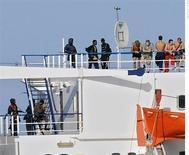VOA标准英语10月-Kenyan Lawmakers Urge Probe of Weapons Seized by(在线收听)
The chairman of Kenya's Parliamentary Select Committee on Security, Fred Kapondi, says his group will summon the country's defense and internal security ministers next week to stem what he calls wild speculation.
 |
| A US Navy photo shows some of the Somali pirates and crew members of MV Faina off Somalia's Indian Ocean coast, 5 Oct. 2008 |
Kapondi told the local media that the committee will seek to establish who owns the shipment of 33 Russian-built T-72 tanks, an assortment of heavy weapons and ammunition aboard the MV Faina freighter, which has been held by Somali pirates since September 26.
Government spokesman Alfred Mutua has repeatedly said the ship's cargo belongs to the Kenyan military and has flatly denied reports from U.S. officials and the head of the East Africa Seafarers' Association Program, Andrew Mwangura, that the final destination of the arms was to be southern Sudan.
Oil-rich South Sudan, which fought a 20-year-long civil war with the northern government in Khartoum, is believed by many in the region to be in an arms build-up before the territory's 2011 referendum on secession.
Last week, police in the port city of Mombasa arrested and jailed Andrew Mwangura for making what the police described as false and alarming statements.
But questions over the transparency of the Kenyan government about its arms purchases have been further raised by a report released Friday by the Stockholm International Peace Research Institute, which tracks the international movement of arms.
The author of the report, Paul Holtom, tells VOA that in recent days, Ukraine filed with the U.N. Register of Conventional Arms as having exported 40,000 automatic rifles, sub-machine guns and over 400 grenade launchers to Kenya in 2007. China reported that it, too, had sent 32 armored vehicles to Kenya last year.
But Holtom says the Kenyan government has told the United Nations that it has not imported any arms at all in the past year.
"The problem with the register is the exporter may well ship in September or October, 2007 and those tanks may arrive in 2008. So, maybe Kenya will report next year. However, it has suggested that some of these weapons arrived in the autumn of 2007. So, I think it undermines Kenya's position as a sponsor of the arms trade treaty in the U.N. It was one of the seven original co-sponsors," says Holtom.
Kenya also has not reported the arms shipment being held in Somalia, which is believed to be a part of the 2007 deal with Ukraine. Holtom says if the consignment of arms really does belong to Kenya, the government should be far more open about the arms it has purchased.
"One of the things we could say is, 'Well, we know they have arrived, so please can you show us that you have those T-72 tanks?' It has been very difficult for us to find evidence that they are actually in Kenya or even in southern Sudan for that matter. He adds, "Last week, I was very willing to give Kenya the benefit of the doubt. But there are more and more questions being raised in subsequent actions in recent days and the jailing of Mwangura is certainly another red flag."
Holtom says it is also significant that Kenya told the United Nations that it was not importing arms on the same day that the Ukrainian freighter was hijacked as it sailed toward Mombasa.